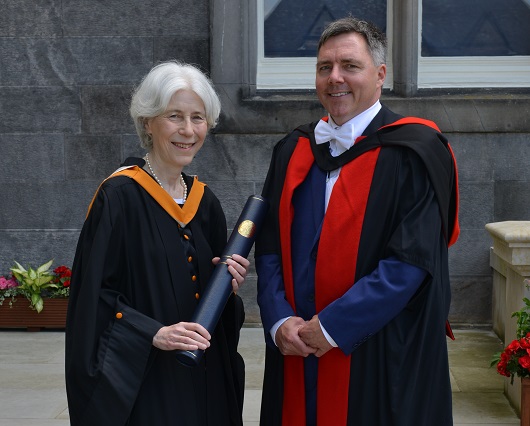Laureation Address: Professor Emma Rothschild

Laureation by Professor Richard Whatmore, School of History, for Professor Emma Rothschild, recipient of the Honorary Degree of Doctor of Letters
Chancellor, it is my privilege to present for the degree of Doctor of Letters, honoris causa, Professor Emma Rothschild.
Are economists human beings? This question has frequently been posed in recent times by those who want to blame economists for failing to predict the financial crisis, for not caring about the poor, and for being advocates of a philosophy founded on selfishness and individualism, necessarily at odds with those promotive of community, self-development and social wellbeing.
Many who have studied the history of economic ideas claim that the root of the problem can be traced to the eighteenth century. It was then that Adam Smith, the great sage of Kirkcaldy, in his Wealth of Nations of 1776, purportedly revealed to the world that if people were left to their own devices, interference of government in the economy minimised and selfishness encouraged, we would all be better off. As Smith wrote, even the poorest frugal peasant in a commercial society was better off than the kings of ten thousand naked savages.
Professor Emma Rothschild set herself the task, and has pursued it over several decades, of revealing that some economists have always been human, and that all of them can be saved; the key is to turn to history, to embrace the practice of all historically-minded scholars; if you want to understand something in the present, you have to begin by going backwards.
Professor Rothschild’s great achievement has been to show that Adam Smith and other economists of the Enlightenment era, including David Hume and those at the cutting edge of economic science in the Scottish universities, were not anti-government. They opposed ‘get-rich quick’, ‘business is infallible’ and ‘let’s be selfish’ approaches to political and economic life. They were incomparable students of human behaviour, of passion, reason and sentiment, fascinated by the play of unintended consequences in human history, and accepting of the fact that if certain policies worked in one place, they would not necessarily work in another. This is a significant lesson from the past to the present, one that we too often forget, because of a commonplace belief in the superiority of our western world over what went before us, in every respect.
Eighteenth-century economists like Adam Smith did not believe in a single science; rather, their studies of wealth formed part of a broader moral philosophy, the science of the statesman or legislator, teaching that humans could be saints or sinners, and needed to be persuaded and managed into doing what was best for society as a whole. You had to assume that people were knaves, capable of excess and prone to corruption; you then had to make laws and policies to prevent this. To be wise you had to follow the ancient Athenian lawmaker Solon, making laws not for an ideal world, but for our world, characterised by failure, confusion and the dominion of the second best, where enthusiasts and projectors abound, and where moderation and understanding are sometimes in short supply.
Professor Rothschild, in a series of path-breaking books (especially Economic Sentiments, 2001), has revealed how much we still have to learn from the economists of the past. As a brilliant intellectual historian she has shown how merchants thought and lived, how they battled to survive in worlds dominated by war, prejudice and bigotry, crossing borders, placating governments, and developing skills to cope with global uncertainty and alien and antagonistic cultures, from Asia to Europe and to North America.
Her more recent book, The Inner Life of Empires (2011), is a tour de force of globalised history: an examination of eighteenth-century world history through the life of one family – a Scottish family no less – the Johnstones, who had connections across Scotland from Clackmannan and Tayside to Dumfries, and across the globe from North America and the Caribbean to India. The archival research that went into this book is staggering, and the result is superb work which blends microhistory, prosopography and world history in novel and ingenious ways.
I might stop there if Professor Rothschild was the kind of academic who writes books and articles in an ivory tower, another assumption about contemporary times very much at odds with the reality. But Professor Rothschild, if her research has shown that selfishness is not the basis of economics, has mirrored this in her own philanthropic behaviour. If I listed the good causes she has been involved in we would be here until sunset. She is a serial encourager of students, promoting their welfare long after she has ceased to be responsible for their tuition, beloved of graduate students, and the organiser of a thousand events, conferences and collaborative research projects. Furthermore, she is a combatant in the wars to save the arts, humanities and social sciences from denigration by those who see them as mere icing on the scientific cake, and in need of the injection of an entrepreneurial spirit focused on profit making. Professor Rothschild is a worthy inheritor of the mantle of the true Adam Smith, being selfless and devoted to public duty.
Chancellor, in recognition of her major contribution to intellectual history and economic thought, I invite you to confer the degree of Doctor of Letters, honoris causa, on Professor Emma Rothschild.
Category Awards